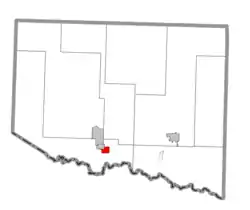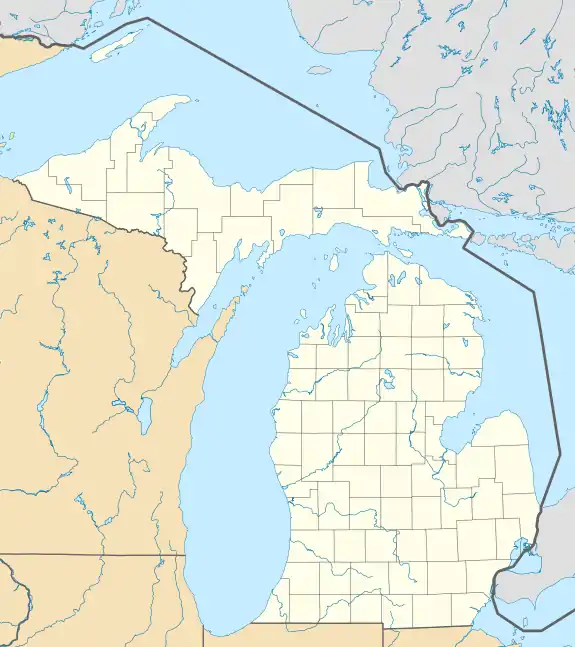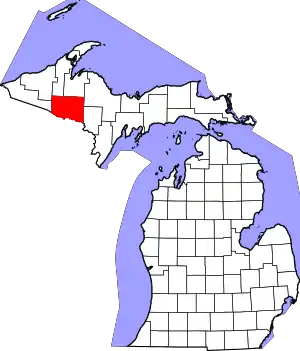Gaastra, Michigan
Gaastra is a city in Iron County in the U.S. state of Michigan. As of the 2010 census, the city population was 347, making it Michigan's third-smallest incorporated city by population after Omer (313) and Lake Angelus (290).[6]
Gaastra, Michigan | |
|---|---|
 Location within Iron County | |
 Gaastra Location within the state of Michigan | |
| Coordinates: 46°3′35″N 88°36′20″W | |
| Country | United States |
| State | Michigan |
| County | Iron |
| Area | |
| • Total | 1.64 sq mi (4.24 km2) |
| • Land | 1.64 sq mi (4.24 km2) |
| • Water | 0.00 sq mi (0.00 km2) |
| Elevation | 1,621 ft (494 m) |
| Population | |
| • Total | 347 |
| • Estimate (2019)[3] | 325 |
| • Density | 198.66/sq mi (76.72/km2) |
| Time zone | UTC-6 (Central (CST)) |
| • Summer (DST) | UTC-5 (CDT) |
| ZIP code | 49927 |
| Area code(s) | 906 |
| FIPS code | 26-31160[4] |
| GNIS feature ID | 0626580[5] |
History
The land was first purchased in 1879 by Alfred Kidder of Marquette. The land was transferred to a number of other owners, Andrew Young (1884), Ediwn H. Piper (1902). The city is named after Douwe Gaastra, a building contractor and real estate speculator who bought the land in October 1908 and platted the town. A post office was established with the first postmaster being Olaf A. Olson on September 26, 1914. It was incorporated as a village in 1919 and as a city in 1949. Olson retired as postmaster in 1953.[7]
Geography
According to the United States Census Bureau, the city has a total area of 1.64 square miles (4.25 km2), all land.[8]
Demographics
| Historical population | |||
|---|---|---|---|
| Census | Pop. | %± | |
| 1920 | 911 | — | |
| 1930 | 755 | −17.1% | |
| 1940 | 773 | 2.4% | |
| 1950 | 575 | −25.6% | |
| 1960 | 582 | 1.2% | |
| 1970 | 479 | −17.7% | |
| 1980 | 404 | −15.7% | |
| 1990 | 376 | −6.9% | |
| 2000 | 339 | −9.8% | |
| 2010 | 347 | 2.4% | |
| 2019 (est.) | 325 | [3] | −6.3% |
| U.S. Decennial Census[9] | |||
2010 census
As of the census[2] of 2010, there were 347 people, 151 households, and 102 families residing in the city. The population density was 211.6 inhabitants per square mile (81.7/km2). There were 179 housing units at an average density of 109.1 per square mile (42.1/km2). The racial makeup of the city was 98.3% White, 0.6% Native American, and 1.2% from two or more races. Hispanic or Latino of any race were 1.2% of the population.
There were 151 households, of which 26.5% had children under the age of 18 living with them, 51.0% were married couples living together, 11.9% had a female householder with no husband present, 4.6% had a male householder with no wife present, and 32.5% were non-families. 30.5% of all households were made up of individuals, and 22.5% had someone living alone who was 65 years of age or older. The average household size was 2.30 and the average family size was 2.82.
The median age in the city was 46.7 years. 23.3% of residents were under the age of 18; 7% were between the ages of 18 and 24; 17.9% were from 25 to 44; 25.9% were from 45 to 64; and 25.9% were 65 years of age or older. The gender makeup of the city was 44.4% male and 55.6% female.
2000 census
As of the census[4] of 2000, there were 339 people, 146 households, and 102 families residing in the city. The population density was 205.9 per square mile (79.3/km2). There were 164 housing units at an average density of 99.6 per square mile (38.4/km2). The racial makeup of the city was 97.35% White, 0.59% Native American, 0.59% from other races, and 1.47% from two or more races. Hispanic or Latino of any race were 0.88% of the population. 22.0% were of Italian, 20.1% Polish, 13.9% Finnish, 10.6% French and 8.1% American ancestry according to Census 2000. 97.3% spoke English and 2.7% Polish as their first language.
There were 146 households, out of which 28.1% had children under the age of 18 living with them, 57.5% were married couples living together, 8.9% had a female householder with no husband present, and 30.1% were non-families. 30.1% of all households were made up of individuals, and 19.9% had someone living alone who was 65 years of age or older. The average household size was 2.32 and the average family size was 2.87.
In the city, the population was spread out, with 24.5% under the age of 18, 6.8% from 18 to 24, 20.9% from 25 to 44, 20.9% from 45 to 64, and 26.8% who were 65 years of age or older. The median age was 44 years. For every 100 females, there were 87.3 males. For every 100 females age 18 and over, there were 86.9 males.
The median income for a household in the city was $23,125, and the median income for a family was $35,521. Males had a median income of $24,750 versus $29,583 for females. The per capita income for the city was $15,797. About 21.2% of families and 22.2% of the population were below the poverty line, including 39.5% of those under age 18 and 10.9% of those age 65 or over.
Government
Gaastra and Caspian operate a police department and the Caspian / Gaastra Volunteer Fire Department together.[6][10]
References
- "2019 U.S. Gazetteer Files". United States Census Bureau. Retrieved July 25, 2020.
- "U.S. Census website". United States Census Bureau. Retrieved 2012-11-25.
- "Population and Housing Unit Estimates". United States Census Bureau. May 24, 2020. Retrieved May 27, 2020.
- "U.S. Census website". United States Census Bureau. Retrieved 2008-01-31.
- "Gaastra". Geographic Names Information System. United States Geological Survey.
- "The 18 tiniest cities in Michigan". Flint Journal. Mlive Media Group. December 4, 2016. p. 19. Retrieved December 5, 2016.
- Romig 1986, pp. 215.
- "US Gazetteer files 2010". United States Census Bureau. Archived from the original on 2012-07-02. Retrieved 2012-11-25.
- "Census of Population and Housing". Census.gov. Retrieved June 4, 2015.
- U.S. Geological Survey Geographic Names Information System: Caspian / Gaastra Volunteer Fire Department
Sources
- Romig, Walter (October 1, 1986) [1973]. Michigan Place Names: The History of the Founding and the Naming of More Than Five Thousand Past and Present Michigan Communities. Great Lakes Books Series (Paperback). Detroit, Michigan: Wayne State University Press. ISBN 081431838X. ISBN 978-0814318386.
